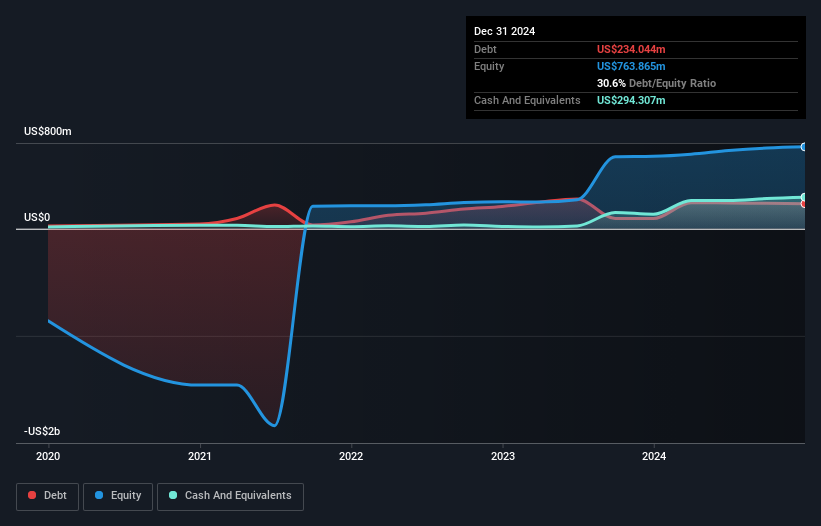Some say volatility, rather than debt, is the best way to think about risk as an investor, but Warren Buffett famously said that 'Volatility is far from synonymous with risk.' It's only natural to consider a company's balance sheet when you examine how risky it is, since debt is often involved when a business collapses. As with many other companies Dutch Bros Inc. (NYSE:BROS) makes use of debt. But the more important question is: how much risk is that debt creating?
When Is Debt A Problem?
Debt and other liabilities become risky for a business when it cannot easily fulfill those obligations, either with free cash flow or by raising capital at an attractive price. In the worst case scenario, a company can go bankrupt if it cannot pay its creditors. While that is not too common, we often do see indebted companies permanently diluting shareholders because lenders force them to raise capital at a distressed price. Of course, the upside of debt is that it often represents cheap capital, especially when it replaces dilution in a company with the ability to reinvest at high rates of return. When we examine debt levels, we first consider both cash and debt levels, together.
What Is Dutch Bros's Net Debt?
You can click the graphic below for the historical numbers, but it shows that as of December 2024 Dutch Bros had US$234.0m of debt, an increase on US$94.6m, over one year. However, its balance sheet shows it holds US$294.3m in cash, so it actually has US$60.3m net cash.

A Look At Dutch Bros' Liabilities
The latest balance sheet data shows that Dutch Bros had liabilities of US$203.1m due within a year, and liabilities of US$1.53b falling due after that. Offsetting these obligations, it had cash of US$294.3m as well as receivables valued at US$10.6m due within 12 months. So its liabilities outweigh the sum of its cash and (near-term) receivables by US$1.43b.
Given Dutch Bros has a humongous market capitalization of US$12.2b, it's hard to believe these liabilities pose much threat. Having said that, it's clear that we should continue to monitor its balance sheet, lest it change for the worse. While it does have liabilities worth noting, Dutch Bros also has more cash than debt, so we're pretty confident it can manage its debt safely.
Check out our latest analysis for Dutch Bros
Pleasingly, Dutch Bros is growing its EBIT faster than former Australian PM Bob Hawke downs a yard glass, boasting a 142% gain in the last twelve months. The balance sheet is clearly the area to focus on when you are analysing debt. But it is future earnings, more than anything, that will determine Dutch Bros's ability to maintain a healthy balance sheet going forward. So if you're focused on the future you can check out this free report showing analyst profit forecasts.
Finally, while the tax-man may adore accounting profits, lenders only accept cold hard cash. Dutch Bros may have net cash on the balance sheet, but it is still interesting to look at how well the business converts its earnings before interest and tax (EBIT) to free cash flow, because that will influence both its need for, and its capacity to manage debt. During the last three years, Dutch Bros burned a lot of cash. While investors are no doubt expecting a reversal of that situation in due course, it clearly does mean its use of debt is more risky.
Summing Up
While Dutch Bros does have more liabilities than liquid assets, it also has net cash of US$60.3m. And we liked the look of last year's 142% year-on-year EBIT growth. So we are not troubled with Dutch Bros's debt use. When analysing debt levels, the balance sheet is the obvious place to start. But ultimately, every company can contain risks that exist outside of the balance sheet. Case in point: We've spotted 2 warning signs for Dutch Bros you should be aware of.
When all is said and done, sometimes its easier to focus on companies that don't even need debt. Readers can access a list of growth stocks with zero net debt 100% free, right now.
New: Manage All Your Stock Portfolios in One Place
We've created the ultimate portfolio companion for stock investors, and it's free.
• Connect an unlimited number of Portfolios and see your total in one currency
• Be alerted to new Warning Signs or Risks via email or mobile
• Track the Fair Value of your stocks
Have feedback on this article? Concerned about the content? Get in touch with us directly. Alternatively, email editorial-team (at) simplywallst.com.
This article by Simply Wall St is general in nature. We provide commentary based on historical data and analyst forecasts only using an unbiased methodology and our articles are not intended to be financial advice. It does not constitute a recommendation to buy or sell any stock, and does not take account of your objectives, or your financial situation. We aim to bring you long-term focused analysis driven by fundamental data. Note that our analysis may not factor in the latest price-sensitive company announcements or qualitative material. Simply Wall St has no position in any stocks mentioned.
About NYSE:BROS
Dutch Bros
Operates and franchises drive-thru shops in the United States.
High growth potential with solid track record.
Similar Companies
Market Insights
Community Narratives




